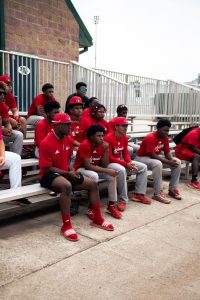
Editor’s Note: This is the first in a two-part series on the difference in opportunities that white and black baseball players are provided. The blogs take a look at my role in helping even the playing field for today’s Black baseball players in the inner city of Atlanta.
A coach moves people. As we have discussed in this blog in the past, before the word “coach” was used in sports, it was strictly used as a means of transportation. There was a horse and a coachman to stir the reins. The coach was where the passengers rested until they reached their destination.
I get so aggravated when there are discussions about the decline of African-Americans playing baseball. My aggravation typically happens when there are photos and videos of those African-American players blessed enough to achieve the success needed to make it to the Major Leagues.
My aggravation is not for those players. I am proud of them and proud of the work they put into making their dreams come true. It is just that not all African-American boys have those same opportunities.
Being Black is not monolithic. Not all African-Americans are having the same life experiences. There are levels to it.
In the area where I was born, Atlanta, if you are born into poverty, you have a 4% chance of making it out of the circumstances you live in. The Atlanta Public Schools serves more than 51,000 students, 80%-plus of whom live at or below the poverty level.
Atlanta has also been deemed “unaffordable” according to the Federal Reserve Bank.
I was born and raised in the inner-city of Atlanta. I used baseball to help escape poverty. I competed as a scholarship student-athlete at Georgia State University and professionally in the Chicago Cubs organization.
When my professional baseball playing career was over, I began coaching in the East Cobb community, a wealthier suburb outside of Atlanta. The money was good and the talent was rich there.
But I failed to coach kids in the inner-city of Atlanta. I believed the rhetoric that Black boys didn’t play baseball.
Reality hit me hard in 2007 when a white parent of a middle-school age client told me there was a decline of Blacks in baseball. He asked why I was not doing anything about it. I was planting seeds in a suburban garden that wasn’t my own. The garden I needed to cultivate was in the inner city of Atlanta.
This convicting moment launched my calling to purpose.
For more information, visit L.E.A.D. Center for Youth today. Also, check out our Digital Magazine.
C.J. Stewart has built a reputation as one of the leading professional hitting instructors in the country. He is a former professional baseball player in the Chicago Cubs organization and has also served as an associate scout for the Cincinnati Reds. As founder and CEO of Diamond Directors Player Development, C.J. has more than 22 years of player development experience and has built an impressive list of clients, including some of the top young prospects in baseball today. If your desire is to change your game for the better, C.J. Stewart has a proven system of development and a track record of success that can work for you.



